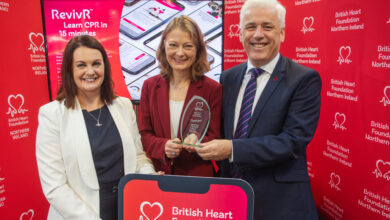Transforming cancer follow-up
![TCFU and Jim Wells Minister[1] TCFU and Jim Wells Minister[1]](http://www.agendani.com/wp-content/uploads/2015/01/TCFUandJimWellsMinister1_thumb.jpg) Macmillan Cancer Support’s Heather Monteverde explains why aftercare must not be an afterthought.
Macmillan Cancer Support’s Heather Monteverde explains why aftercare must not be an afterthought.
Every day in Northern Ireland, 30 people find out that they have cancer. More and more of us are surviving for longer but, for many people affected by cancer, getting back into their normal routine can prove difficult.
The physical and enduring side-effects of cancer and its treatment can range from general fatigue to chronic pain, osteoporosis and heart failure. Then there are financial difficulties, resulting from taking time off work and potential long-term unemployment. Finally, there’s the fear of the cancer coming back.
Given the projected numbers of cancer survivors, we know that current health and social care provision will not be able to meet demand in the long term. That’s why Macmillan Cancer Support has invested more than £1 million in the Transforming Cancer Follow Up programme. Put simply: if cancer is becoming more of a long-term condition, aftercare cannot be an afterthought.
Macmillan has been working with the Health and Social Care Board, the Public Health Agency and Northern Ireland Cancer Network (NICaN) to remodel the traditional ‘one size fits all’ approach, based around routine follow-up appointments, and instead provide individually tailored patient care.
As part of the new ‘recovery package’, every patient has access to a Clinical Nurse Specialist (CNS) who will discuss all their needs in the form of a written ‘care plan’, which they can take away with them. An additional treatment summary helps both patients and their GPs understand their treatment and the possible longer term consequences and complications which might arise.
Finally, people are invited to go along to a ‘health and wellbeing’ event, where they hear about all the practical things they can do to keep well. Many people say they like having the opportunity to discuss issues with other people affected by cancer.
Access to information and support throughout this process is key. People with cancer should be pointed in the direction of their nearest Macmillan Information Centre and know how to access the ‘cancer survivorship’ website, which will help them find a range of local support services, patient groups, complementary therapies and financial advice on their doorstep.
Results to date have been encouraging. The Transforming Cancer Follow Up programme has been implemented by Northern Ireland’s five Health and Social Care Trusts as the new model for breast cancer follow up and progress is being made in remodelling prostate and colorectal cancer aftercare with a view to including other tumour groups.
Around 45 per cent of newly diagnosed breast cancer patients are now taking up self-directed aftercare with the guarantee that, should any problem occur, they will be seen quickly by a specialist. This has resulted in a significant reduction in waiting lists for routine follow-up appointments. Fewer hospital visits for some means more time with clinicians for patients with more complex needs.
If the needs of people with cancer are properly identified, discussed and documented, their care will improve. The provision of information, support and signposting to services should help people on the route to recovery to live as long – and as healthy a life – as possible.
Heather Monteverde is General Manager of Macmillan Cancer Support in Northern Ireland. For information and support, call the Macmillan team free on 0808 808 0000 (Monday to Friday, 9am-8pm), visit www.macmillan.org.uk or www.survivorship.cancerni.net






